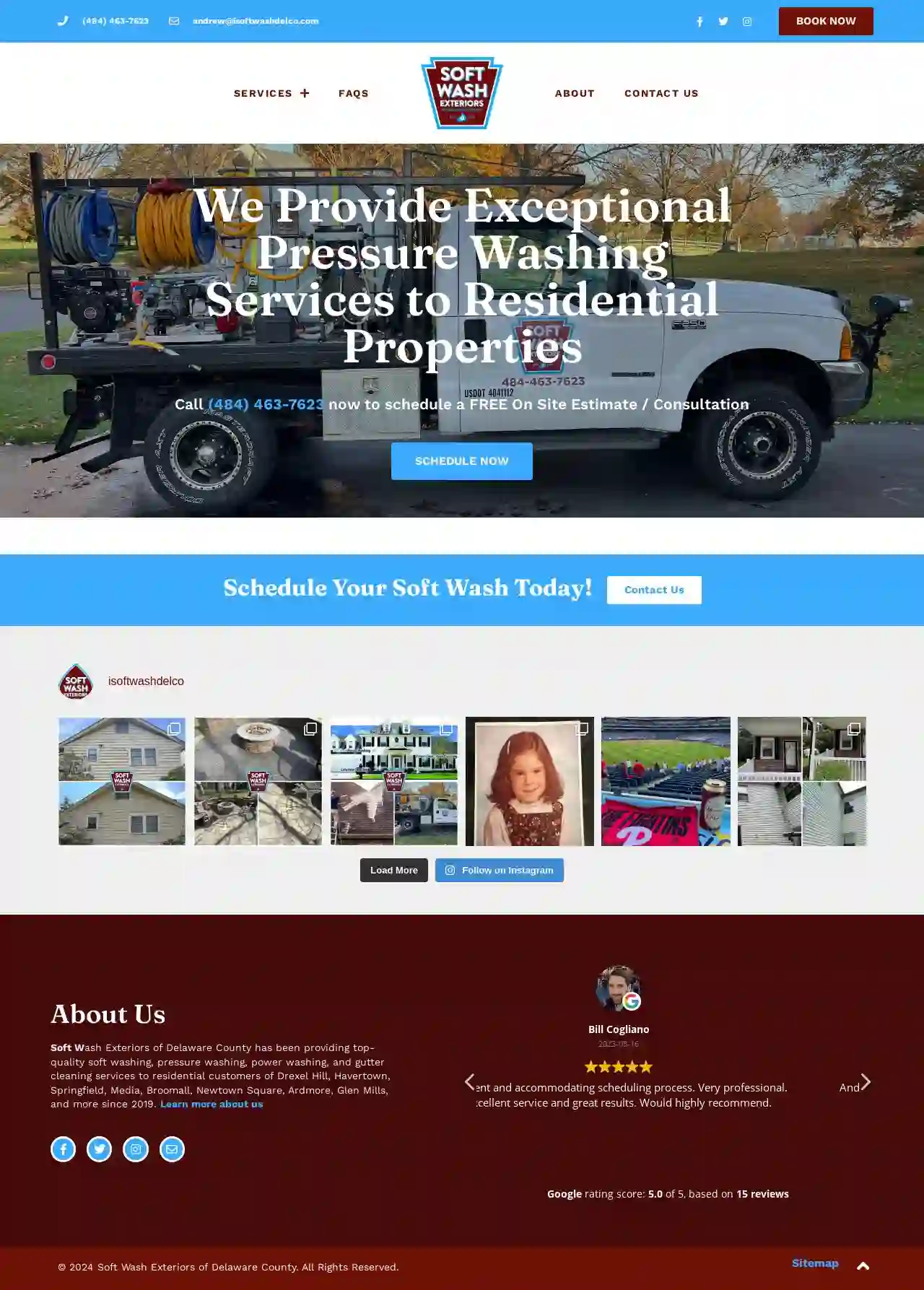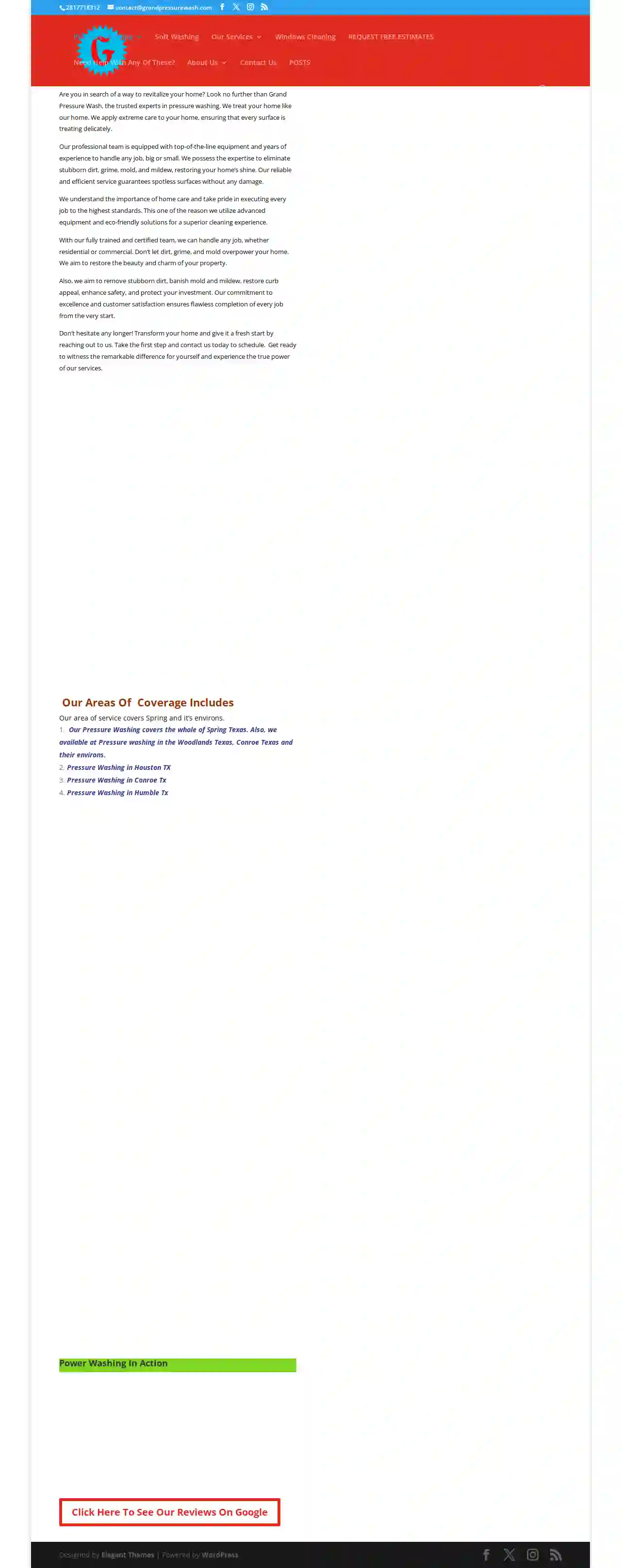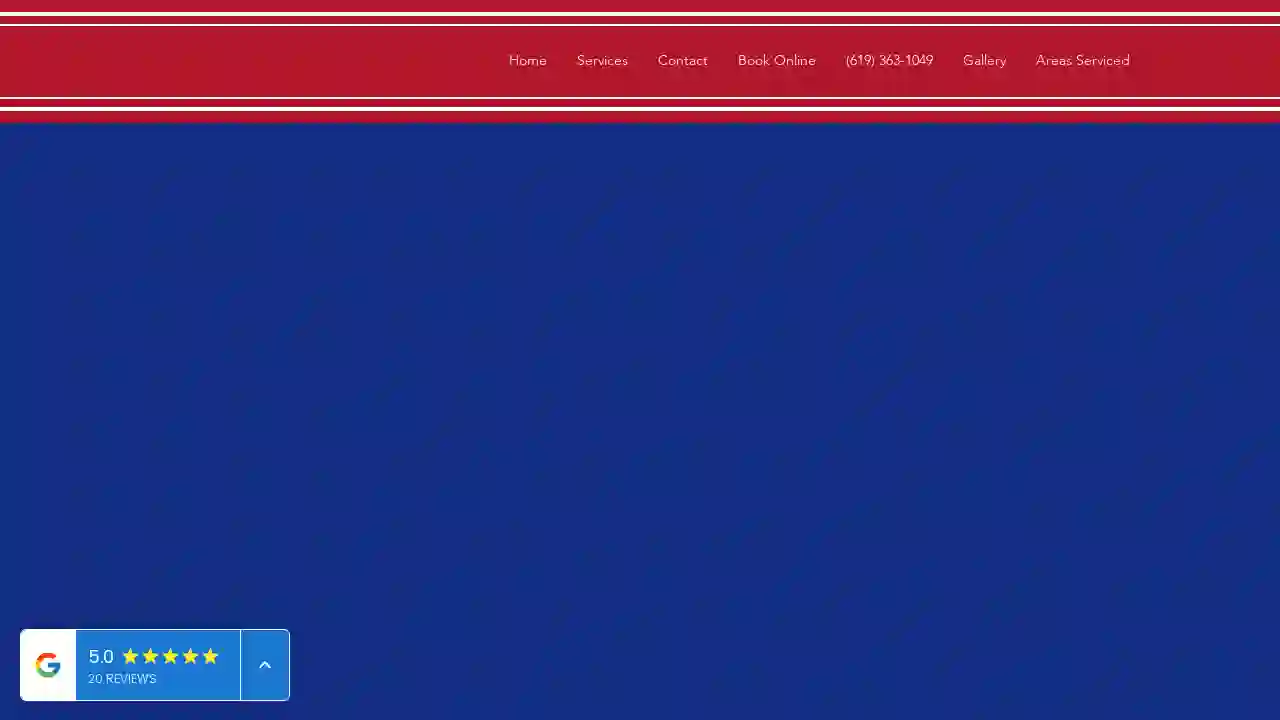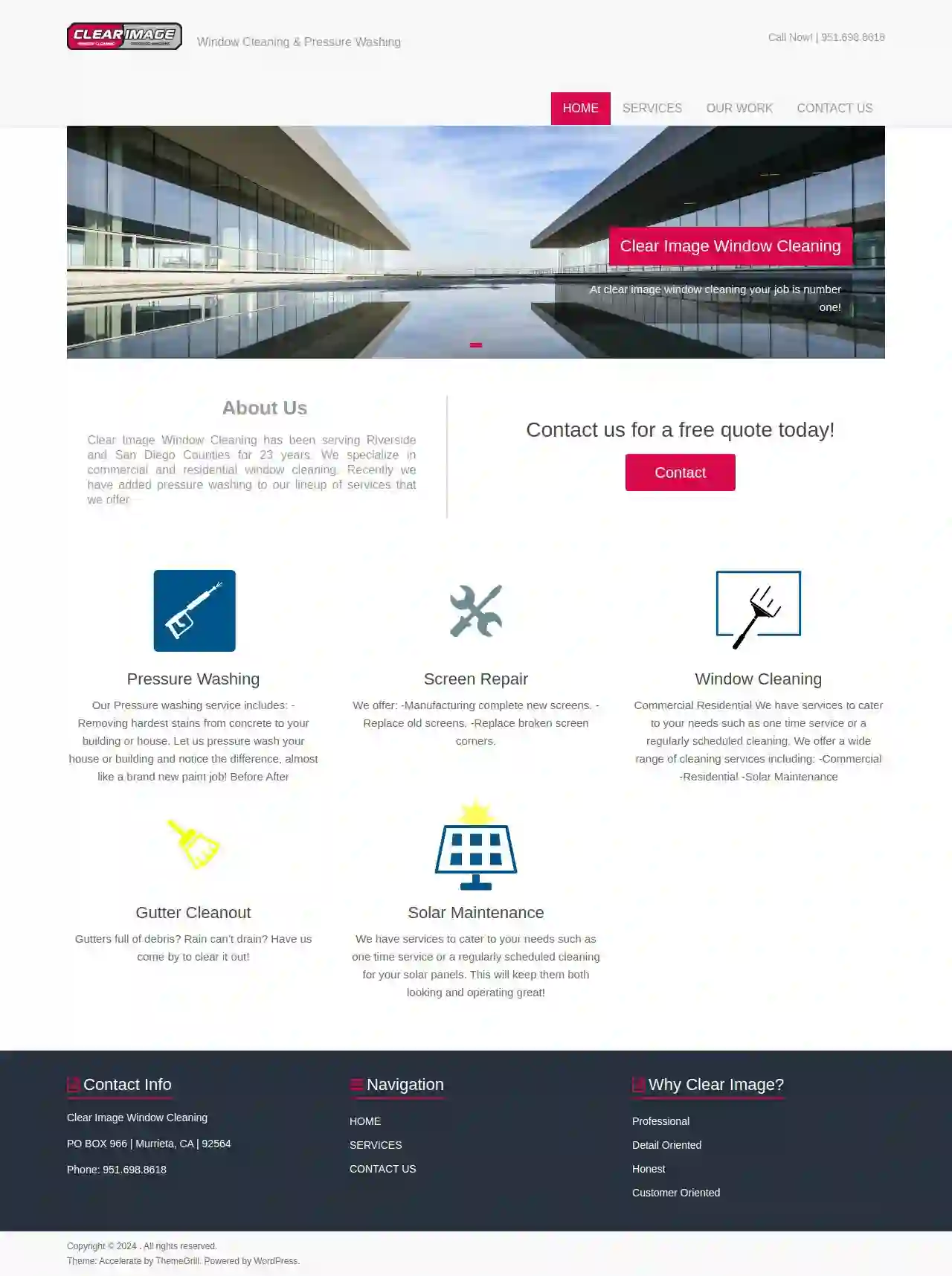Pressure Washing South Whittier
Find the best Exterior Cleaning in South Whittier
Receive multiple Driveway Cleaning quotes for your project today! Compare profiles, reviews, accreditations, portfolio, etc... and choose the best deal.

Diamond State Pressure Washing, LLC
4.912 reviewsSeaside, USDIAMOND STATE PRESSURE WASHING OFFERS RESIDENTIAL & COMMERCIAL CLEANING SERVICES Diamond State Pressure Washing, LLC is your one-stop shop for all your exterior cleaning needs. We specialize in a soft wash method that makes your home or business look like new. Our team of experienced professionals is dedicated to providing high-quality service at competitive prices. We offer a wide range of services, including house washing, roof washing, stucco soft washing, fence cleaning, driveway pressure washing, sidewalk, curb & washing, patio pressure washing, brick cleaning & power washing, gutter cleaning & whitening, graffiti removal, and window cleaning. We also offer commercial cleaning services for schools, playgrounds, dumpster pads, exterior apartment buildings, gas & service stations, shopping centers, store fronts, strip malls, restaurants, banks, churches, and office buildings. Get a free quote today!
- Services
- Why Us?
- Accreditations
- Gallery
Get Quote
EZ Pressure Washing
54 reviewsHighland, CA, 92404, USEZ Pressure Washing is a full-service pressure washing and soft washing company serving the Southern California area. As a local business, we take pride in enhancing residential and commercial investments in our community. We specialize in pressure and soft washing and work diligently to provide safe and effective cleaning. Utilizing the most modern technology and eco-friendly equipment, the EZ Pressure Washing team is committed to providing exceptional results with a customer focused approach.
- Services
- Why Us?
- Accreditations
- Our Team
- Testimonials
- Gallery
Get Quote
Soft Wash Exteriors of Delaware County, LLC
515 reviews123 Main St, Drexel Hill, 19026, USSoft Wash Exteriors of Delaware County has been providing top-quality soft washing, pressure washing, power washing, and gutter cleaning services to residential customers of Drexel Hill, Havertown, Springfield, Media, Broomall, Newtown Square, Ardmore, Glen Mills, and more since 2019.
- Services
- Why Us?
- Accreditations
- Our Team
- Testimonials
- Gallery
Get Quote
Pressure Washing San Diego North
56 reviewsSan Diego, USPressure Washing San Diego North is a professional pressure washing company that provides top-notch services to residential and commercial clients in San Diego and surrounding areas. With a commitment to quality and customer satisfaction, we use state-of-the-art equipment and eco-friendly cleaning solutions to deliver exceptional results. Our team of experts is dedicated to providing personalized service, ensuring that every client receives a perfect fit. With over a decade of experience and an A+ rating from the Better Business Bureau, we are the trusted choice for pressure washing services in San Diego North.
- Services
- Why Us?
- Accreditations
- Our Team
- Testimonials
- Gallery
Get Quote
Virginia Pressure Wash LLC
532 reviews123 Main St, Culpeper, VA, 22701, USWelcome to Virginia Pressure Wash LLC, your premier choice for professional exterior cleaning services in Culpeper, VA, and throughout Northern and Central VA. With a commitment to excellence and customer satisfaction, we take pride in delivering superior results for all your cleaning needs.
- Services
- Why Us?
- Gallery
Get Quote
Grand Pressure Wash
4.976 reviewsWoodland, USGrand Pressure Wash is a professional pressure washing and soft washing company serving residential and commercial clients in Spring, TX, and surrounding areas like The Woodlands, Conroe, and Humble. We treat every home like our own, applying meticulous care to ensure every surface is cleaned delicately. Our team of highly skilled technicians utilizes modern equipment and eco-friendly solutions to deliver exceptional results. We specialize in eliminating stubborn dirt, grime, mold, and mildew, restoring your property's shine and curb appeal. We are committed to providing top-notch service, exceeding customer expectations, and protecting your investment. With our advanced techniques and expertise, we aim to enhance the safety and beauty of your home.
- Services
- Why Us?
- Gallery
Get Quote
OnPoint Solar Panel Cleaning San Diego
5125 reviewsClairemont, CA, 92117, USOnPoint Solar Panel Cleaning San Diego is a company that specializes in residential and commercial solar panel cleaning, gutter cleaning, pressure washing, window cleaning, and screen cleaning. The company was founded by two friends, Marlon Porter and Taylor Mishler, who have a passion for providing high-quality cleaning services. They have years of experience in the window cleaning industry and have learned what it takes to be the best. OnPoint Solar Panel Cleaning San Diego is committed to providing exceptional customer service and ensuring that every job is done right. They use purified water and solar-safe brushes to clean solar panels, and their team of experienced employees will advise you on the best cleaning method for your specific needs. OnPoint Solar Panel Cleaning San Diego is licensed and insured, and they offer a free estimate for all services.
- Services
- Why Us?
- Accreditations
- Our Team
- Gallery
Get Quote
Blast Bros. Power Washing's Pressure Washing Services
4.913 reviewsMurrieta, USBlast Bros. Power Washing provides the best pressure washing and soft washing services to Murrieta, Temecula, Lake Elsinore, Menifee, and surrounding Southern California areas. Fair prices, superior quality and exceptional customer service are guaranteed when you work with us! When working with a pressure washing or soft washing professional, it's important to make sure they have your best interests at heart by having things like insurance in place. We give our clients full peace of mind and transparency, you can find our policy here.
- Services
- Why Us?
- Our Team
- Testimonials
- Gallery
Get Quote
Clear Image Window Cleaning & Pressure Washing
51 reviewsPO BOX 966, Murrieta, 92564, USClear Image Window Cleaning has been serving Riverside and San Diego Counties for 23 years. We specialize in commercial and residential window cleaning. Recently we have added pressure washing to our lineup of services that we offer. At clear image window cleaning your job is number one!
- Services
- Why Us?
- Gallery
Get Quote
Power Play Pressure Washing
5257 reviews67 Walden Rd., Lebanon, 17042, USPower Play Inc. offers a SAFE power washing. We would love the opportunity to show why our customers keep coming back to our reliable service with outstanding results in the exterior cleaning industry. Your house is your haven, and the outside should be just as clean as the inside. Call us today for a house washing quote. Our services include professional and efficient wood deck and fence restoration services. Power Play Washing specializes in cleaning Composite Decks, Vinyl Fences and more. Let our professionals power wash and seal your patios, sidewalks, driveways, and more. Soft Washing Roof Cleaning removes black staining and UGLY mildew streaking SAFEL with No Pressure, Safe for your Shingles! Add 5 Years to the Life of Your Roof by restoring water resistance, granular adhesion, and flexibility. We Love the SoyFuze product! Whether you are looking for Soft Washing or Pressure Washing you have found the right spot. Our mobile pressure washing business has served Lancaster, PA and Lebanon, PA since 2002! Power Play Inc. offers professional services that prove power washing can be both Great & Safe. Soft Washing also works great in for some house pressure cleaning and commercial pressure cleaning jobs. Years of Experience: Power Play Inc. has been pressure washing Lancaster, PA since its start in 2002. We’ve served Lebanon, PA since 2007. Professionalism Worth Talking About: Most of our business is by word-of-mouth! Happy customers pass on our information to their family and friends. Thorough Cleaning That Can’t Be Beat: Our professional pressure washers are detail-oriented, making sure every nook and cranny is cleaned on your home, business, deck, and more.
- Services
- Why Us?
- Gallery
Get Quote
Over 60,241+ Janitorial Companies in our network
Our janitorial companies operate in South Whittier & beyond!
CleaningMatch has curated and vetted the Best Cleaning Services near South Whittier. Find a top & reliable pro today.
Frequently Asked Questions About Pressure Washing
- Pressure Washing: Suitable for hard surfaces like concrete, brick, stone, and decks that can withstand high pressure. Effective for removing stubborn dirt, grime, and stains.
- Soft Washing: Best for delicate surfaces like roofs, siding, painted surfaces, and wood fences that may be damaged by high pressure. Effective for removing mold, mildew, algae, and other contaminants without causing harm.
- Online Reviews: Check online reviews on platforms like Google, Yelp, and Facebook to gauge customer satisfaction and service quality.
- Experience and Expertise: Look for companies with a proven track record and experience in pressure washing various surfaces.
- Licensing and Insurance: Ensure the company is licensed and insured to protect you from liability in case of accidents or damage.
- Equipment and Techniques: Inquire about the company's equipment and techniques to ensure they use appropriate pressure levels and cleaning solutions for different surfaces.
- Quotes and Pricing: Obtain detailed quotes from multiple pressure washing companies and compare their pricing. Make sure the quotes are transparent, outlining all services and costs.
- Professionalism and Communication: Choose a company that is responsive, provides clear communication, and demonstrates professionalism in its interactions.
- Hard Surfaces: Pressure washing is often successful in removing graffiti from hard surfaces like brick, concrete, or metal.
- Delicate Surfaces: For delicate surfaces like wood or painted surfaces, a gentler approach using specialized graffiti removal products and techniques may be necessary.
- Professional Graffiti Removal: For stubborn or extensive graffiti, consider hiring a professional graffiti removal service. They have specialized equipment, cleaning solutions, and experience in dealing with various types of graffiti.
- Cover or Shield Plants: Before pressure washing, cover or shield delicate plants and landscaping with tarps, plastic sheeting, or painter's tape to protect them from water spray and chemicals.
- Use Lower Pressure Settings: If pressure washing near plants, use lower pressure settings and avoid directing the spray directly at them.
- Rinse Plants with Water: After pressure washing, rinse plants thoroughly with plain water to dilute any chemicals that may have landed on them.
- Choose Plant-Safe Cleaning Solutions: If using cleaning solutions, opt for environmentally friendly or plant-safe options whenever possible.
How do I know if I need pressure washing or soft washing?
If you're unsure which method is best for your surfaces, consult with a professional pressure washing company. They can assess your needs and recommend the most appropriate cleaning method.
How do I find a good pressure washing service?
Utilize online directories like CleaningMatch to find and compare qualified pressure washing services in your area.
Can pressure washing remove graffiti?
If you're attempting DIY graffiti removal, always test the cleaning solution and pressure washing technique on an inconspicuous area first to avoid damaging the surface.
Can pressure washing damage my plants?
Taking these precautions minimizes the risk of damage to your plants and landscaping during pressure washing.
How do I know if I need pressure washing or soft washing?
- Pressure Washing: Suitable for hard surfaces like concrete, brick, stone, and decks that can withstand high pressure. Effective for removing stubborn dirt, grime, and stains.
- Soft Washing: Best for delicate surfaces like roofs, siding, painted surfaces, and wood fences that may be damaged by high pressure. Effective for removing mold, mildew, algae, and other contaminants without causing harm.
If you're unsure which method is best for your surfaces, consult with a professional pressure washing company. They can assess your needs and recommend the most appropriate cleaning method.
How do I find a good pressure washing service?
- Online Reviews: Check online reviews on platforms like Google, Yelp, and Facebook to gauge customer satisfaction and service quality.
- Experience and Expertise: Look for companies with a proven track record and experience in pressure washing various surfaces.
- Licensing and Insurance: Ensure the company is licensed and insured to protect you from liability in case of accidents or damage.
- Equipment and Techniques: Inquire about the company's equipment and techniques to ensure they use appropriate pressure levels and cleaning solutions for different surfaces.
- Quotes and Pricing: Obtain detailed quotes from multiple pressure washing companies and compare their pricing. Make sure the quotes are transparent, outlining all services and costs.
- Professionalism and Communication: Choose a company that is responsive, provides clear communication, and demonstrates professionalism in its interactions.
Utilize online directories like CleaningMatch to find and compare qualified pressure washing services in your area.
Can pressure washing remove graffiti?
- Hard Surfaces: Pressure washing is often successful in removing graffiti from hard surfaces like brick, concrete, or metal.
- Delicate Surfaces: For delicate surfaces like wood or painted surfaces, a gentler approach using specialized graffiti removal products and techniques may be necessary.
- Professional Graffiti Removal: For stubborn or extensive graffiti, consider hiring a professional graffiti removal service. They have specialized equipment, cleaning solutions, and experience in dealing with various types of graffiti.
If you're attempting DIY graffiti removal, always test the cleaning solution and pressure washing technique on an inconspicuous area first to avoid damaging the surface.
Can pressure washing damage my plants?
- Cover or Shield Plants: Before pressure washing, cover or shield delicate plants and landscaping with tarps, plastic sheeting, or painter's tape to protect them from water spray and chemicals.
- Use Lower Pressure Settings: If pressure washing near plants, use lower pressure settings and avoid directing the spray directly at them.
- Rinse Plants with Water: After pressure washing, rinse plants thoroughly with plain water to dilute any chemicals that may have landed on them.
- Choose Plant-Safe Cleaning Solutions: If using cleaning solutions, opt for environmentally friendly or plant-safe options whenever possible.
Taking these precautions minimizes the risk of damage to your plants and landscaping during pressure washing.